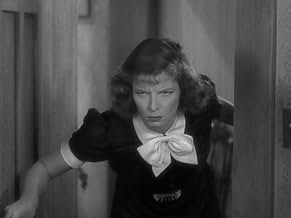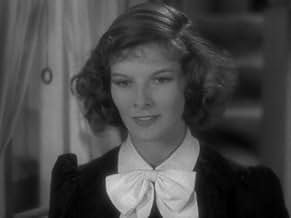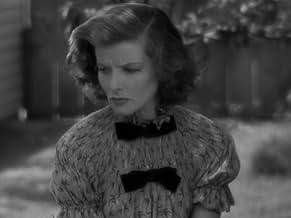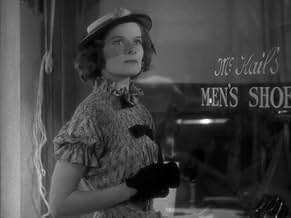NOTE IMDb
6,9/10
4,7 k
MA NOTE
Ajouter une intrigue dans votre langueA working-class girl is thwarted and embarrassed in her attempts to move up socially by her gauche family and unstable father.A working-class girl is thwarted and embarrassed in her attempts to move up socially by her gauche family and unstable father.A working-class girl is thwarted and embarrassed in her attempts to move up socially by her gauche family and unstable father.
- Nommé pour 2 Oscars
- 1 victoire et 3 nominations au total
Hattie McDaniel
- Malena
- (as Hattie McDaniels)
Brooks Benedict
- Henrietta's Dance Partner
- (non crédité)
Harry Bowen
- Laborer Putting Up Sign
- (non crédité)
Steve Carruthers
- Party Guest
- (non crédité)
Monte Carter
- Waiter at Restaurant
- (non crédité)
George Ford
- Party Guest
- (non crédité)
Joe Gilbert
- Party Guest
- (non crédité)
Histoire
Le saviez-vous
- AnecdotesThough Bette Davis won the 1935 Academy Award/Oscar for L'Intruse (1935) beating out Katharine Hepburn in Désirs secrets (1935), Davis was noted for saying more than once that she didn't deserve the award that year and that the one who did was Katharine Hepburn.
- GaffesWhen Alice walks with Arthur toward her house for the first time, a woman watering her shrubs can be seen and a letter carrier walks up, then back down her porch steps twice. The background scene repeats itself, letter carrier, woman setting down hose, etc. The letter carrier approaches Alice moments later where she then has to shamefully admit to Arthur that this is, indeed, her house that she is in front of. Likely a rear projection scene that was duplicated.
- Citations
Mrs. Adams: Malena fell down the cellar stairs!
Virgil Adams: Did she break any of our things?
- ConnexionsFeatured in George Stevens: A Filmmaker's Journey (1984)
Commentaire à la une
I had literally just completed my reading of Booth Tarkington's novel from which this movie was adapted before settling down to watch Katharine Hepburn star in the title role of this early George Stevens film.
It's a little creaky for sure as you might expect from an old 1935 feature and even if it does tack on a happy ending at variance with the original book, it would take a hard heart to seriously object to the upturn in Alice and her father's fortunes as things turn out.
The story of a sparky, pretty young girl brought up in rather straitened circumstances by her well-meaning but rather down-trodden parents, she is excited to be attending a high society party in the neighbourhood where maybe she can catch the eye of a handsome, wealthy young man who will elevate her from her life of comparative drudgery and give her the good life she craves. However, forced to wear an old dress long out-of-fashion and with no friends with whom to pal about, she's reduced to taking dances from the prize klutz and then playing wall-flower before she by chance meets up with poor little rich boy Arthur Russell played by Fred McMurray, apparently the fiancé of the wealthy deb holding the party but who sees past Alice's outer appearance to the good person within and promptly falls for her.
There are side plots involving Alice's rascally brother who eventually steals money from his employer, while her old dad, played by Fred Stone, employed at the same firm, is egged on by his henpecking wife on the pretext of improving Alice's prospects, to finally get out from his sinecure and set up a glue business in competition with his erstwhile employer, the vaunted big-man-in-town A J Lamb.
It all comes to a head when mum holds a big family dinner to formally meet and greet Arthur in a painfully excruciating scene where everything that can happen to embarrass the bold Alice duly does but just when it seems that poverty and ignominy awaits the family and that Alice may have to shock-horror go out and work for a living, along come two acts separate acts of charity and compassion at the end which transform all their fortunes, especially Alice's.
It's impossible to deny Alice her happy ending, so sympathetically and engagingly does Hepburn play the part. At this early stage in her career, some of her later irritating ticks and mannerisms are largely absent so that you really want things to turn out well for her. Likewise Fred Stone as her put-upon father, who finds his backbone in the end, even if his "Dang me!" protestations in that wheedling voice of his will likely set your nerves on edge. McMurray too is charming as the suave playboy who turns his back on his privileged but mean-spirited social equals for the love of poor but honest Alice.
One thing I didn't enjoy were the stereotypical demeaning parts given to black actors in the film, like seeing Hattie McDaniels as a slatternly hired-help but to be fair they are as written in the book, although if the producer could take the liberty to change the ending, it's just a pity they couldn't have done something similar with the casting of these parts.
Still, this was an enjoyable and entertaining mild-morality tale, made memorable mainly by Hepburn's bright performance in the title role.
It's a little creaky for sure as you might expect from an old 1935 feature and even if it does tack on a happy ending at variance with the original book, it would take a hard heart to seriously object to the upturn in Alice and her father's fortunes as things turn out.
The story of a sparky, pretty young girl brought up in rather straitened circumstances by her well-meaning but rather down-trodden parents, she is excited to be attending a high society party in the neighbourhood where maybe she can catch the eye of a handsome, wealthy young man who will elevate her from her life of comparative drudgery and give her the good life she craves. However, forced to wear an old dress long out-of-fashion and with no friends with whom to pal about, she's reduced to taking dances from the prize klutz and then playing wall-flower before she by chance meets up with poor little rich boy Arthur Russell played by Fred McMurray, apparently the fiancé of the wealthy deb holding the party but who sees past Alice's outer appearance to the good person within and promptly falls for her.
There are side plots involving Alice's rascally brother who eventually steals money from his employer, while her old dad, played by Fred Stone, employed at the same firm, is egged on by his henpecking wife on the pretext of improving Alice's prospects, to finally get out from his sinecure and set up a glue business in competition with his erstwhile employer, the vaunted big-man-in-town A J Lamb.
It all comes to a head when mum holds a big family dinner to formally meet and greet Arthur in a painfully excruciating scene where everything that can happen to embarrass the bold Alice duly does but just when it seems that poverty and ignominy awaits the family and that Alice may have to shock-horror go out and work for a living, along come two acts separate acts of charity and compassion at the end which transform all their fortunes, especially Alice's.
It's impossible to deny Alice her happy ending, so sympathetically and engagingly does Hepburn play the part. At this early stage in her career, some of her later irritating ticks and mannerisms are largely absent so that you really want things to turn out well for her. Likewise Fred Stone as her put-upon father, who finds his backbone in the end, even if his "Dang me!" protestations in that wheedling voice of his will likely set your nerves on edge. McMurray too is charming as the suave playboy who turns his back on his privileged but mean-spirited social equals for the love of poor but honest Alice.
One thing I didn't enjoy were the stereotypical demeaning parts given to black actors in the film, like seeing Hattie McDaniels as a slatternly hired-help but to be fair they are as written in the book, although if the producer could take the liberty to change the ending, it's just a pity they couldn't have done something similar with the casting of these parts.
Still, this was an enjoyable and entertaining mild-morality tale, made memorable mainly by Hepburn's bright performance in the title role.
Meilleurs choix
Connectez-vous pour évaluer et suivre la liste de favoris afin de recevoir des recommandations personnalisées
Détails
- Date de sortie
- Pays d’origine
- Langue
- Aussi connu sous le nom de
- Alice Adams
- Lieux de tournage
- Société de production
- Voir plus de crédits d'entreprise sur IMDbPro
- Durée1 heure 39 minutes
- Couleur
- Rapport de forme
- 1.37 : 1
Contribuer à cette page
Suggérer une modification ou ajouter du contenu manquant

Lacune principale
By what name was Désirs secrets (1935) officially released in India in English?
Répondre























